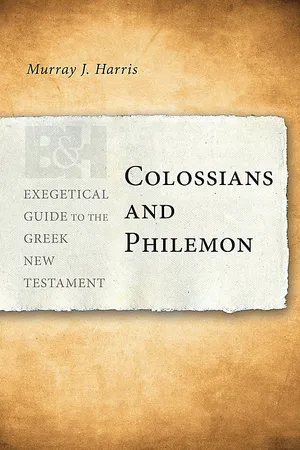III.(2:4–3:4)
A. WARNING AGAINST SPECIOUS PHILOSOPHY (2:4–8)
STRUCTURE
In this paragraph Paul warns the Colossians of two dangers confronting them: (a) that of being deluded by beguiling sophistry (v. 4), and (b) that of being carried off as booty by empty, delusive philosophy (v. 8).
(a) Τοῦτο λέγω ἵνα μηδεὶς the danger of
ὑμᾶς παραλογίζηται being deceived
ἐν πιθανολογίᾳ by persuasive argument
ἐν αὐτῷ περιπατεῖτε the protection available:
ἐρριζωμένοι living in Christ, and
ἐποικοδομούμενοι four characteristics
βεβαιούμενοι of this life
περισσεύοντες
(b) βλέπετε μή τις the danger of
ὑμᾶς . . . ὁ συλαγωγῶν being kidnapped
διὰ τῆς φιλοσοφίας καὶ by meaningless,
κενῆς ἀπάτης deceptive philosophy
κατά the origin and content
κατά of this philosophy
οὐ κατὰ Χριστόν
VERSE 4
Τοῦτο λέγω ἵνα μηδεὶς ὑμᾶς παραλογίζηται
Μηδείς is nom. sg. masc. of the subst. and adj. μηδείς, μηδεμία, μηδέν, nobody, no. Ἵνα μηδείς, “in order that no one,” “to make sure that no one” (NJB) is equivalent to μή τις, “lest anyone” (v. 8). Παραλογίζηται is 3 sg. pres. mid. subjunc. (after ἵνα) of dep. παραλογίζομαι, deceive/delude by false reckoning or reasoning (see MM 487; see MH 319 on παρα-, “aside”).
It is possible that ἵνα is impv. and τοῦτο prospective: “What I mean is this: let no one deceive you” (sim. NEB mg., GNB; Moule 145). On impv. ἵνα see BDF §388; Moule 144–45; T 94–95, 102; Z §415; for prospective τοῦτο, cf. 1 Cor 1:12; Gal 3:17. More probably, however, ἵνα is telic and τοῦτο retrospective (as in John 5:34): “I am telling you this so that no one talks you into error” (REB; sim. most EVV and commentators). Λέγω refers to the present written communication (BDAG 590a) and the antecedent of τοῦτο is either vv. 1–3 in general, or v. 3 in particular (viz. the all-sufficiency and finality of Christ as God’s disclosed mystery).
ἐν πιθανολογίᾳ
᾽Εν is instr.—either “by (means of)/“by resorting to” (Cassirer), or “with” (= “using”). Πιθανολογία (-ας, ἡ ), from πιθανός (“persuasive”) and λόγος (“word, argument, speech”), was used in CGk. in a positive sense of (the use of) probable argument rather than conclusive proof (ἀπόδειξις; cf. 1 Cor 2:4). Here it is used in a pejorative sense and variously rendered “beguiling speech” (RSV), “plausible sophistry” (Weymouth), “arguments that sound reasonable” (NET), “specious arguments” (BDAG 812d; REB, NJB; Barth-Blanke 3 [see 285 there for LXX usage]—taking the noun as a generic sg.) or “persuasiveness of speech” (RV).
VERSE 5
εἰ γὰρ καί
This verse affords evidence (γάρ, “for”) of Paul’s concern for his readers’ spiritual welfare (1:29; 2:1) or supplies the reason why they are not really candidates for deception (v. 4). Εἰ . . . καί (here “although,” “even if,” not “if indeed”) introduces a concessive clause whose apodosis begins with ἀλλά, “yet,” “certainly,” “at least” (cf. BDF §448[5]).
τῇ σαρκὶ ἄπειμί ἀλλὰ τῷ πνεύματι σὺν ὑμῖν εἰμι
1 sg. pres. act. indic. of ἄπειμι, be absent, be away. Some tr. (Weymouth, Goodspeed, TNIV) supply “from you” (ἀφ᾽ ὑμῶν) to balance “with you” (σὺν ὑμῖν). The τῇ σαρκί—τῷ πνεύματι antithesis is not moral but physical: “in body” (= τῷ σώματι, 1 Cor 5:3)—“in s...
